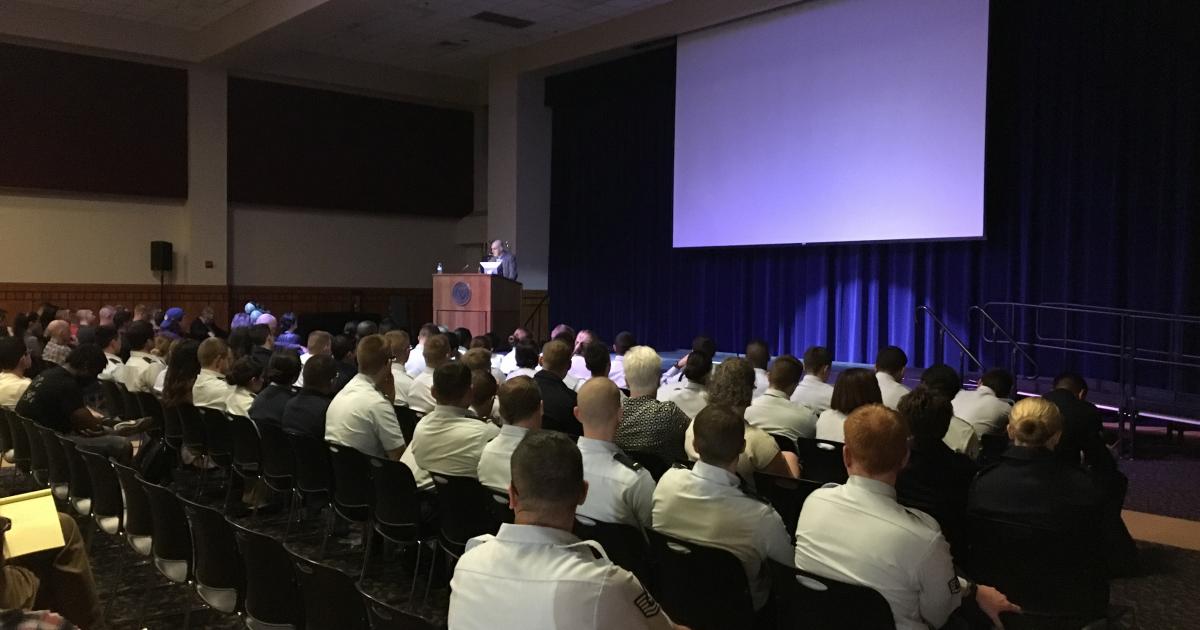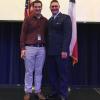SAN ANGELO, TX - Tuesday afternoon, Mark B. Feierstein, former special assistant to President Barack Obama for western hemisphere affairs, informed the San Angelo public about the U.S. - Cuban relations during Angelo State University's Annual E. James Holland – Roy A. Harrell Jr. Foreign Affairs Speaker Program.
Students, faculty, Goodfellow personnel and members of the community gathered in the C.J. Davidson Center to hear from Feierstein and his experience with foreign affairs. The discussion comes at a time when the U.S. population is still adjusting to a new administration, a topic that Feierstein says will directly impact the future relations with countries like Cuba.
Cuba’s History
A big factor regarding this relationship relies heavily on what the new administration plans to do, Feierstein said.
America plays a role as one of the world's super powers, meaning many countries look to the U.S. for guidance and observe the decisions made by the U.S. government at all times.
This discussion also comes at a time when Cuba faces significant changes as Raul Castro steps down as Prime Minister of the Communist government in spring of 2018. This change could mark the first time since 1959 that Cuba will not have a leader from the Castro dynasty.
Fidel Castro stepped down as Prime Minister of Cuba in 2008 and appointed his younger brother, Raul Castro, to take his place. After Fidel passed away in November of last year, the government has continued business as usual with little to no change.
“The Cuban government is not monolithic,” Feierstein said. “Fidel’s passing could create greater reform in Cuba.”
Fidel wasn’t the only component upholding the government in Cuba. Feierstein mentioned the rumored effects of Fidel’s passing on the Cuban government were over exaggerated.
One policy Cuba could move towards is more internet access for the Cuban people. Currently, only five percent of the population have access to the internet, according to Feierstein. Through expanding this internet access, a greater demand would be created for U.S and Cuban business deals. Something that has already sparked interest with businesses in the U.S.
Since Raul took office in Cuba, the country turned towards privatization with the selling of property and giving access to cell phone usage for the populous. The government took more notice of failed economic approaches and was open to criticism on the past revolution Cuba was part of.
Feierstein added that the U.S. continues to have a significant impact in the Caribbean, especially in Cuba.

U.S. and Cuba Relations Past and Present
The U.S. and Cuba have undergone much adversary in the past, from the U.S. trade embargo that has been upheld by the U.S. since March of 1958, to the great escalation during the Cold War period that had the U.S. Government trying to overthrow Fidel Castro during The Bay of Pigs Invasion of 1961.
Feierstein referenced these historical moments and said the history will always be there, but that doesn’t have to be a road block for future relations with Cuba. He said he believes the U.S. has always been in a position to help better the world despite recent controversy regarding the new administration and the executive orders being signed by President Donald Trump.
Several initiatives have happened recently, he said, to foster better relations with Cuba, including the realization that isolation hasn’t achieved the outcomes desired by the U.S. in the first place.
Cuban-Americans, especially the younger generation, are increasingly more receptive to normalized relations, Feierstein said. The normalization movement Feierstein referred to is the desire to uphold good relations between Cuba and the U.S.
This movement is seen as necessary for restoring relations and has been in motion since Obama was President. Feierstein mentioned this doesn’t seem to be a top priority for the new administration, but did acknowledge that he worked with his replacement by briefing him on the position of senior director for western hemisphere affairs on the National Security Council.
Trump's Administration Addressing Cuban Relations
Feierstein said a new administration will always take time to organize and prepare the objectives and goals of the office; however, he feels taking too much time can cause relations to falter, especially with countries that have adverse history like the U.S. and Cuba.
Feierstein also said he couldn’t get a clear understanding of where the U.S. will approach relations with Cuba from his briefing, but worries that a "bullying" approach of challenging Cuba has never gone well throughout history.
He recalled when Obama shook hands with Raul Castro at Nelson Mandela's funeral at the end of 2013. He said this simple action meant a lot to the Cuban people, for it was a gesture of respect.
He said he understands that President Trump and Secretary of State Tillerson will take a tougher approach to human rights; however, they might be less careful with upholding the transparency of programs initiated by the Obama administration in Cuba. This includes the U.S. State Department's travel program that has gained more popularity for Cuban-Americans who visit family and opens up possibilities of future trade and business agreements with Cuba.
Feierstein noted that the U.S. Congress has already began addressing the possibility of lifting the trade embargo with Cuba after constituents involved in farming and agriculture, tourism, and business industries have showed interest in working with the country.
“My hope is change will come quicker than we realize,” Feierstein said.
He added that this change would come quicker if the U.S. wasn’t an enemy of Cuba, and he recommended that the new administration have patience; business deals with a prepared and stronger Cuba could produce new opportunities for both countries.
If Cuba can allow for more freedom of speech and freedom of assembly through improved internet accesses, then this could produce the mentioned outcomes of cooperation with the U.S.
Since Cuba doesn’t have the bureaucratic numbers that the U.S. does to push these reforms in place, it will take time to accomplish. Officials in Cuba have less independence to make changes because the country still runs under the Cuban Communist Party.
“Sometimes, as a policy maker, you feel you are in a lose-lose situation, as criticism will be shown no matter what is decided,” Feierstein said.
Feierstein closed the discussion by saying the Trump Admiration might surprise the U.S. by making the mentioned changes, though it has been rumored by White House officials and career colleagues of Feierstein that, because Cuban relations are tied to Obama’s legacy, there will be little incentive to prioritize U.S.- Cuban relations in the immediate future.
In regards to yesterday's presentation, Jeffery G. Boone, Ph.D., Department of Communications and Mass Media at ASU, spoke about the Foreign Affairs Speaker Program and what students gain from the presentations.
"This is a great opportunity for students to meet and hear from people who have been all over the world,” Boone said. “These are people who have -- or who still are -- influencing or crafting foreign policy for the United States."
Carlos Tovar, ASU student, said he believes the discussion over these relations isn’t well-known by students, and he was happy the presentation was held on campus. He thinks certain business, like agriculture, would be a component in forging relations with Cuba to create jobs and profit for the industry.
ASU has held theses lectures annually since 2003. Some of the guest speakers of the past include U.S. Ambassador Edward L. Peck (2006), Middle East Institute Scholar Molly Williamson (2012), and Chairman James N. Purcell Jr. (2016).
Subscribe to the LIVE! Daily
Required






Post a comment to this article here: